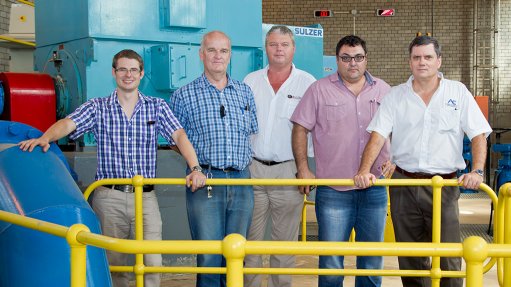
CLEAN WATER Members of the project team, from left, Edzard Verseput, Stuart Fergusson, Simon Atkins, Kiewiet and Kevin McRae who will manage the phase two expansion of the Nooitgedagt water treatments works for the Nelson Mandela Bay Municipality
The second-phase construction of the Nooitgedagt Water Treatment Works (WTW) in the Eastern Cape, which will cost R126.4-million, has begun. This project will double the WTW’s capacity to 140-million litres a day.
The WTW will supply an additional 70 Mℓ of water per day to the Nelson Mandela Bay area by February 2017 to meet the increasing demand for water in the region, comprising more than one- million people.
The Nelson Mandela Bay Municipality (NMBM) Water Management and Bulk Supply acting director Stuart Fergusson says the metro’s water demand is increasing at more than 3% a year.
“To satisfy this water demand, the national Department of Water and Sanitation initiated a study to evaluate and prioritise all available water resources to the Algoa Bay region,” says Fergusson. The Nooitgedagt-Coega Low Level Scheme (NCLLS) was identified as the next water augmentation project available to the metro,” he explained.
Phase 2 will include the construction of six new filters and the extension of the filter control building, as well as the new low-lift pumpstation, which will complete the NCLLS water supply pipeline to Port Elizabeth.
Phase 2 construction will be followed by Phase 3 and a further 45-million-litre reservoir at Olifantskop.
Phase 2 includes the use of new filter technology and ultraviolet (UV) light for better quality and increased volumes of water supply to the water-stressed NMBM.
AfriCoast Consulting Engineers is the engineering consultancy appointed for the project and will provide the civil and structural, as well as the mechanical and electrical engineering services for the project.
AfriCoast Water and Sanitation executive manager Kevin McRae tells Engineering News that the new technology is more efficient than the previous false-floor and nozzle systems used at Nooitgedagt WTW; it allows for more water to be filtered over longer periods, with less frequent backwashing and cleaning of the filters.
“Using UV light as part of the disinfection process is also a first for the NMBM. The decision to use UV was based on several factors, including better water quality and reduced consumption of chlorine gas. Chlorine will still be used for final disinfection.”
UV light is 100% effective in destroying harmful organisms, such as cryptosporidium and giardia species, which can cause gastrointestinal tract infections in humans, McRae notes, adding that the presence of these organisms has not been detected in the raw water supplied to Nooitgedagt WTW to date.